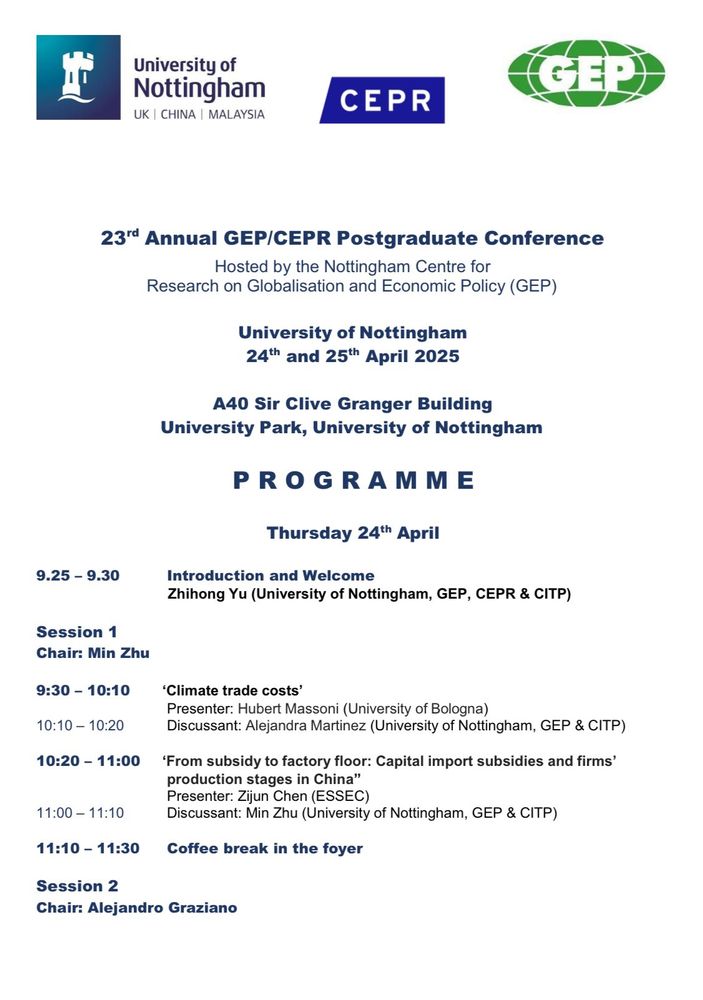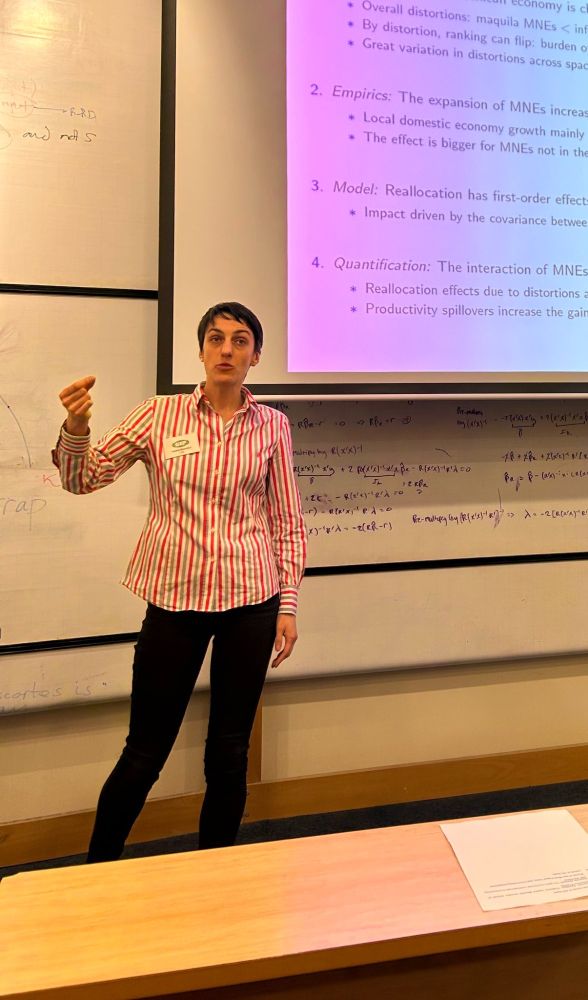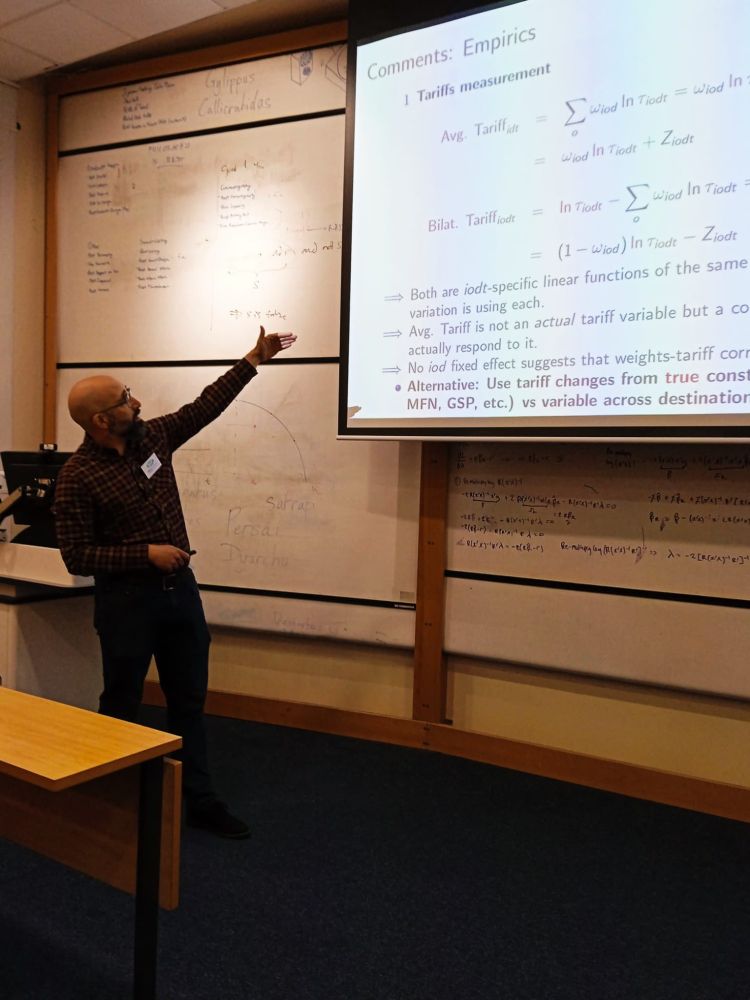Reminder call for all PhD students & Postdocs! Join the Nottingham International Trade Summer School from 30 June - 5 July. Explore #trade insights with leading experts, present research, network with peers & attend a leading workshop in the field. For details 👉 www.nottingham.ac.uk/gep/news-eve...
30.04.2025 10:37 — 👍 1 🔁 3 💬 0 📌 0

Why Rising Markups Hurt Innovation and Widen Inequality - ProMarket
Over the past four decades, the United States has seen rising market power, slowing productivity growth, and deepening wealth inequality. In new research, Giammario Impullitti and Pontus Rendahl explo...
Over the past 40 years, the US has seen rising market power, slowing productivity growth, and deepening wealth inequality. @gimpulli.bsky.social (@uniofnottingham.bsky.social) and Pontus Rendahl explore how declining competition may be the common culprit.
Originally featured in VoxEU.
19.03.2025 14:08 — 👍 3 🔁 1 💬 0 📌 0
Non-technical write-up of my work with Pontus Rendahl on the impact of market power on economic growth and wealth inequality.
13.03.2025 16:15 — 👍 0 🔁 0 💬 0 📌 0
The consequences for households wellbeing? The poor get hit with a double whammy—stagnant wages and a rising wealth gap. Meanwhile, the top 1% (especially the top 0.1%) keep pulling ahead.
05.02.2025 12:52 — 👍 0 🔁 0 💬 0 📌 0
Market power also crushes wages. Less competition means profits take a bigger share, while lower productivity growth weakens future wage increases.
05.02.2025 12:51 — 👍 0 🔁 0 💬 0 📌 0
In contrast, low-income households, reliant on wages and lacking substantial savings, see little benefit. Many cannot save at all or only save for emergencies, making them less responsive to rising returns.
05.02.2025 12:51 — 👍 0 🔁 0 💬 0 📌 0
Why? Because the rich and poor react differently to changes in returns. The wealthy, who own most assets, benefit directly from higher returns, compounding their wealth.
05.02.2025 12:51 — 👍 0 🔁 0 💬 0 📌 0
As firms gain dominance, markups increase, driving up corporate profits and boosting asset returns (r). Meanwhile, reduced competition stifles innovation and productivity growth (g). This widening gap between asset returns and economic growth—r - g—exacerbates wealth inequality.
05.02.2025 12:50 — 👍 0 🔁 0 💬 0 📌 0
DP19911 Market power, growth, and wealth inequality
In recent decades, the United States has experienced a notable rise in markups, a slowdown in productivity growth, and an increase in wealth inequality. We present a framework that unifies these trends into a common driving force. In particular, increased barriers to entry raises markups and boost corporate profits. Rising profits elevates firm valuations, fuels the demand for capital, and drives up asset returns. At the same time, the reduction in competition stifles overall economic growth. Wealth inequality is shaped by the return gap, r-g, which represents the difference between asset returns and the economy’s growth rate. The rise in capital demand together with a reduction in growth leads to a widening of the return gap, which amplifies inequality by affecting the saving patterns of households in different ways across the wealth distribution, deepening the divide between the rich and the poor. These trends result in substantial welfare losses for the majority of households, while only the top 1%, and especially the top 0.1% experience gains.
How does rising market power affect growth and the distribution of wealth? With
@pontus_rendahl
we explore these links in our new paper, cepr.org/publications..., @cepr.org
#growth, #inequality, #markups. A thread.
05.02.2025 12:50 — 👍 2 🔁 1 💬 5 📌 0
Senior editor @ucpress.bsky.social. Finicky reader. (She/her)
I'm an Assistant Professor of Economics at ICADE, U Comillas, in Madrid. I work on International Trade Policy, International Business, Political Economy, and Latin American Economic History. In 🇪🇸 via 🇺🇸 & 🇬🇧 from 🇺🇾
https://www.orianamontti.com
Professor of Economics @ Sao Paulo School of Economics - FGV
Research on International Trade; Torcedor do/Fan of CAM; 🇧🇷🇬🇧
https://sites.google.com/site/emanuelornelaseo/
Economist. I study international trade, labo(u)r markets, and economic development. Work @LSE 🇨🇷
https://jpvasquez-econ.github.io
Chaired Professor at Paris School of Economics, Director of the Institute for Macroeconomic and International Policies (i-MIP)
Personal page : http://www.lionel-fontagne.eu/
Research Division Asia, German Institute for International and Security Affairs (SWP)
trying to make sense of China and the Indo-Pacific or life, the universe and everything
Sustainability | Governance
Trust is built in complexity
Engagement ≠ Alignment
Senior Economist at Resolution Foundation, researching trade, growth and living standards.
We are the Department of Economics at the University of Zurich and our mission is to #pioneeringeconomics.
www.econ.uzh.ch
Head of Projects and Research
@enc-europe.bsky.social
ENcouncil.org
Economist interested in macro, trade, int econ, econ hist | UCL researcher | formerly OBR, UBristol, NYU, Columbia, UBC | Drinker of tea, particularly green | 🇨🇦 -> 🏴
Econ Professor @ ND. Macroeconomics and (mainly Bayesian) Econometrics
Research Fellow at @bancaditalia
Research Associate at @CESifoNetwork
Fields of Interest: Trade & IO
Website: https://fabrizioleone.github.io/
Economist at King's College London. Trade, development, migration, political madness, grand corruption. pierrelouisvezina@weebly.com
Professor of Economics at University of Warwick, CEP/LSE, CEPR, British Chambers of Commerce. Former advisor HM Treasury, House of Lords. International trade, macroeconomics, finance.
Columbia Business School Assistant Professor. Growth, firms, cities.
Econ PhD, Job Market Candidate, 2024-25, from @UChicago
Macroeconomics, Environmental, International Trade
Alumn from @sciencespo, and @sorbonne_univ
Website: http://thomasbourany.github.io/
From France 🥖🧀🍷🥐🇫🇷




